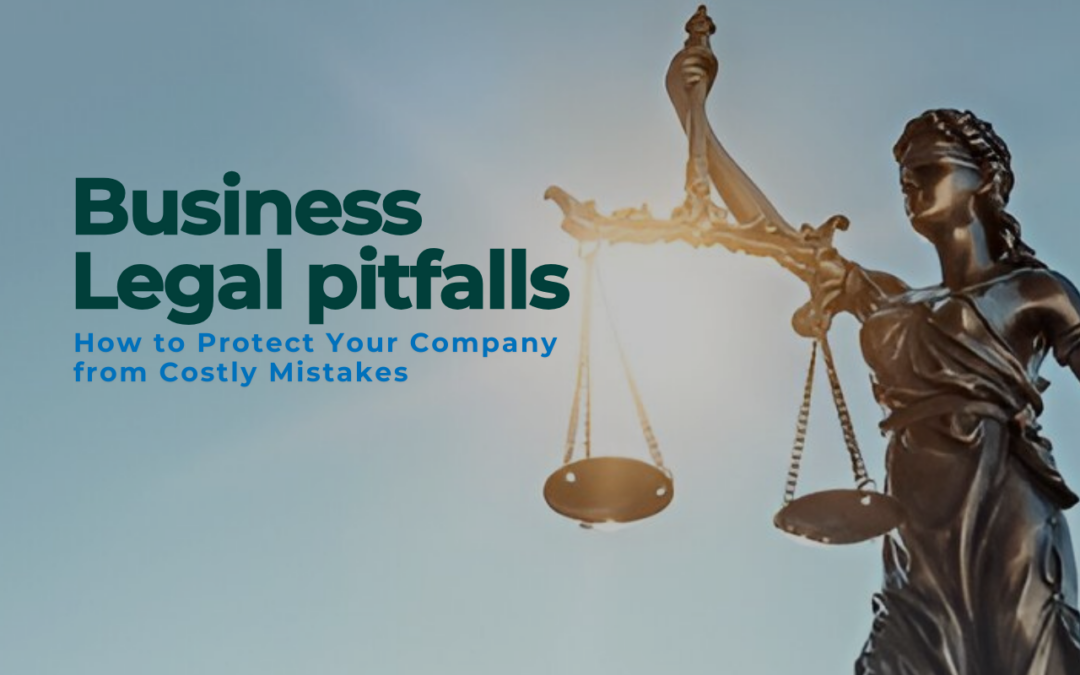Starting and running a business is an exciting venture filled with opportunities for growth and success. However, the path to business prosperity is also riddled with legal pitfalls that can lead to costly mistakes if not carefully navigated. This ultimate guide will help you identify common legal issues and provide strategies to protect your company.
1. Failing to Choose the Right Business Structure
Choosing the wrong business structure can have significant legal and financial repercussions. Whether it’s a sole proprietorship, partnership, LLC, or corporation, each structure comes with distinct legal obligations, tax implications, and liability risks. Consult with a legal advisor to determine the best structure for your business goals and needs.
Example: A small tech startup initially operated as a sole proprietorship. As the business grew, the owner faced personal liability for business debts. Switching to an LLC provided the necessary liability protection and tax benefits, which could have been avoided had the correct structure been chosen from the start.
2. Neglecting to Draft Clear Contracts
Contracts are the backbone of business operations. Poorly written or verbal agreements can lead to misunderstandings, disputes, and legal battles. Ensure all business relationships are governed by clear, comprehensive contracts that outline roles, responsibilities, payment terms, and dispute resolution mechanisms.
Example: A marketing firm hired a freelance graphic designer without a written contract. When disputes arose over project deadlines and payment terms, the lack of documentation made it difficult to resolve the issue, leading to legal fees and damaged relationships.
3. Ignoring Intellectual Property Protection
Your brand, products, and creative works are valuable assets. Failing to protect intellectual property (IP) through trademarks, copyrights, and patents can result in lost revenue and legal disputes. Regularly audit your IP and seek legal guidance to secure proper protections.
Example: A bakery created a unique logo and signature cake recipe but did not trademark or copyright them. A competitor copied the logo and recipe, causing brand confusion and lost customers. Legal action could have been avoided with proper IP protection.
4. Non-Compliance with Employment Laws
Employment law violations are a common legal pitfall. This includes issues related to hiring practices, employee classification, workplace safety, and termination procedures. Stay updated on labor laws, provide regular training to HR personnel, and maintain detailed employment records.
Example: A retail business misclassified full-time employees as independent contractors to avoid providing benefits. This led to a costly lawsuit, back pay, and penalties after an employee filed a complaint with the labor board.
5. Overlooking Regulatory Requirements
Different industries are subject to various regulatory requirements. Non-compliance with industry-specific laws can result in hefty fines, legal actions, and business shutdowns. Conduct regular compliance audits and stay informed about changes in regulations affecting your industry.
Example: A small food manufacturing company failed to comply with new health and safety regulations. A surprise inspection resulted in fines and temporary closure until compliance was achieved, impacting revenue and reputation.
6. Inadequate Data Privacy and Cybersecurity Measures
With the rise of digital business operations, data breaches have become a significant legal risk. Ensure your company complies with data protection laws like GDPR or CCPA, implements robust cybersecurity protocols, and regularly trains employees on data security best practices.
Example: An e-commerce site experienced a data breach due to weak security protocols, exposing customer information. The breach led to legal action, regulatory fines, and loss of customer trust, severely affecting the business’s growth.
7. Poor Record-Keeping and Documentation
Accurate and organized records are crucial for legal compliance and defense against potential lawsuits. This includes financial records, tax documents, employment files, and corporate minutes. Establish a systematic record-keeping process and conduct periodic reviews.
Example: A consulting firm failed to maintain proper tax documentation. During an audit, they could not provide the necessary records, resulting in fines and back taxes owed to the IRS.
8. Failing to Obtain Necessary Licenses and Permits
Operating without the required licenses and permits can lead to legal penalties and business closures. Research the necessary local, state, and federal licenses for your business activities and ensure timely renewals.
Example: A construction company started a project without securing the necessary building permits. A government inspection halted the project, causing delays, fines, and additional costs to meet compliance.
9. Not Having a Risk Management Plan
Risk management is essential for identifying potential legal threats and implementing strategies to mitigate them. Develop a comprehensive risk management plan that covers legal, financial, operational, and reputational risks.
Example: A financial services firm did not have a risk management plan in place. When faced with a data breach, the company struggled to respond effectively, leading to prolonged downtime, client dissatisfaction, and regulatory scrutiny.
10. Avoiding Legal Counsel
Many business owners avoid consulting legal professionals to save costs, only to face more significant expenses due to legal issues later. Establish a relationship with a trusted business attorney who can provide proactive legal advice and representation when needed.
Example: A startup signed an international partnership agreement without legal review. The contract contained unfavorable terms that led to a costly dispute, which could have been avoided with proper legal counsel.
Conclusion
Understanding and addressing these common business legal pitfalls can save your business from costly mistakes and legal entanglements. Proactive legal planning, regular compliance checks, and professional business legal pitfalls counsel are vital components of a resilient business strategy. By staying informed and prepared, you can focus on growing your business with confidence and security.













